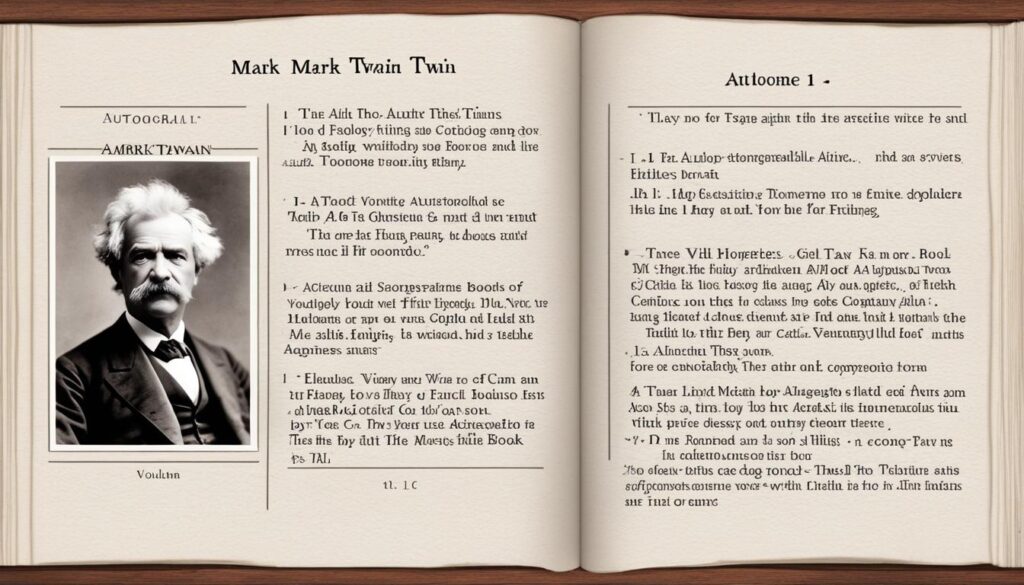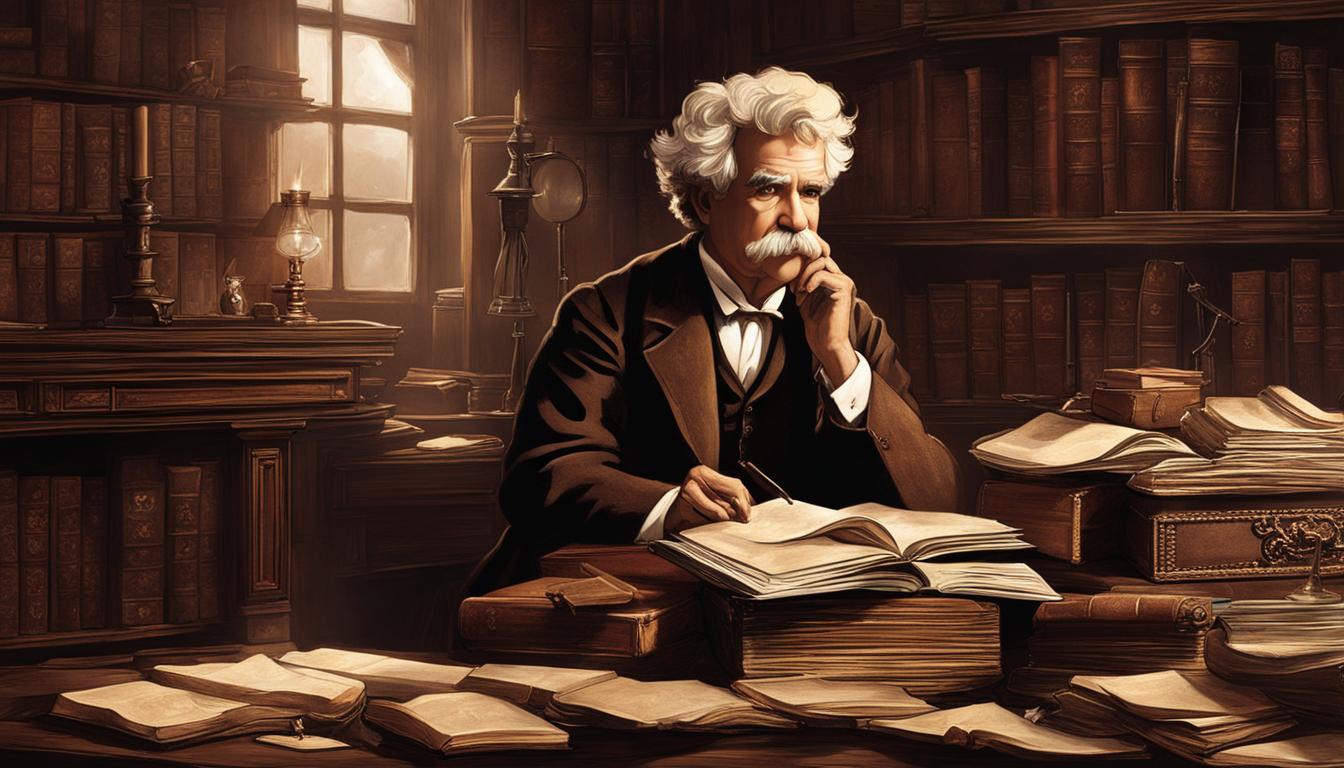Overview of “Autobiography of Mark Twain, Volume 1”
Discover the captivating story of Mark Twain’s life through the audiobook “Autobiography of Mark Twain, Volume 1.” In this audiobook review, we provide an overview of the audiobook, offering insights into Mark Twain’s biography and his unique autobiographical style.
This autobiography is a must-read for anyone interested in the life and works of Mark Twain and the history of American literature. From his early life on the Mississippi River to his travels abroad and eventual fame as a writer, Mark Twain’s life was full of adventure and rich experiences. The audiobook “Autobiography of Mark Twain, Volume 1” captures these experiences in a vivid and engaging way, allowing listeners to gain a deeper understanding of this literary icon.
The Content of the Autobiography
The autobiography consists of stories and anecdotes from various stages of Twain’s life, told in his unique writing style. The content is arranged thematically, with Twain sharing his thoughts and perspectives on various aspects of life, such as politics, religion, and family.
In the audiobook, Twain’s words are brought to life by a talented voice actor who captures his wit and humor, making for an entertaining and thought-provoking listening experience.
The Background of the Autobiography
The “Autobiography of Mark Twain, Volume 1” was released posthumously and is based on Twain’s dictations and writings. Twain began writing his autobiography in 1870 but abandoned the project several times. He eventually resumed work on the autobiography in 1905, hoping to create a more authentic and personal account of his life.
The audiobook offers not only Twain’s memoirs but also previously undisclosed information about his life, making it a valuable resource for academics and literary enthusiasts alike.
Narration and Production Quality of the Audiobook
The audiobook “Autobiography of Mark Twain, Volume 1” offers a captivating listening experience thanks to the excellent narration and production quality. The voice actor’s performance captures the essence of Mark Twain’s personality, imbuing the text with an engaging and authentic feel.
The pacing and tone of the narration create a natural flow that makes it easy to follow and stay connected to Twain’s story. The overall production quality is top-notch, with crisp and clear audio that enhances the immersive experience.
Overall, the audiobook’s narration and production quality do justice to Mark Twain’s writing and storytelling. It’s a recommended choice for anyone interested in discovering the life and works of this iconic American author.
Analysis of Mark Twain’s Life and Works
Mark Twain’s life and works are a significant part of American literature. “Autobiography of Mark Twain, Volume 1” offers an insightful glimpse into the life of this great writer.
Twain lived a fascinating life, full of twists and turns. Born Samuel Langhorne Clemens in Florida, Missouri, he began his writing career as a journalist and later switched to writing fiction. He is best known for his novels such as “The Adventures of Tom Sawyer” and “Adventures of Huckleberry Finn,” both of which are literary classics. He was a popular speaker and humorist, famous for his wit and satire.
In his autobiography, Twain reflects on his life and the influences that shaped his writing style. He also discusses a range of themes, from politics to human nature. Through his personal accounts, readers gain a deeper understanding of Twain’s perspectives and beliefs.
Twain’s writing style is characterized by his use of vernacular language and humor. He believed in using colloquial speech to create an authentic voice for his characters, and his writing often reflected his sharp wit and biting satire. His work has influenced generations of writers and continues to be widely read today.
Overall, “Autobiography of Mark Twain, Volume 1” provides a fascinating analysis of Twain’s life and works. By examining his writing style, themes, and influences, readers can gain a greater appreciation of his literary contributions and his impact on American literature.
Themes and Messages Explored in the Autobiography
Mark Twain’s “Autobiography of Mark Twain, Volume 1” offers readers a unique perspective on Twain’s ideas about society, politics, and human nature. The book is filled with meaningful messages that continue to resonate with readers today.
Themes Explored
The autobiography covers a range of themes, including:
- Identity and self-reflection
- Success and failure
- Race and racism
- Social norms and conventions
- Creativity and imagination
Through his personal accounts, Twain offers insights into these themes and invites readers to think critically about them.
Twain’s Perspectives
Twain’s unique perspectives on these themes are an essential aspect of the book. Twain’s unconventional way of looking at the world shines through in his writing, making the autobiography a captivating read. His perspectives provoke thought and inspire readers to question their own beliefs.
Meaningful Messages
The autobiography is filled with meaningful messages that are as relevant today as they were when Twain wrote them. These messages include:
“The difference between the almost right word and the right word is really a large matter—’tis the difference between the lightning bug and the lightning.”
Twain’s quote about the power of language highlights the importance of choosing our words carefully. It reminds us that our words have the potential to create significant impacts on others and ourselves.
Historical and Cultural Context of Mark Twain’s Autobiography
Mark Twain’s autobiography provides a valuable window into the cultural and historical context of his era. Born in 1835, Twain witnessed significant social and political changes during his lifetime, including the Civil War and Reconstruction era.
In his autobiography, Twain reflects on his experiences growing up in a slaveholding state and his attitudes towards race and slavery, revealing the complex and conflicted views of many white Americans in the mid-nineteenth century. He also discusses the impact of the Industrial Revolution and the growth of American cities, as well as the influence of new media such as newspapers and telegraphs on American culture.
“The Mississippi River town of Hannibal, Missouri, was where I was born and grew up. … I would not ask any one to know Hannibal who has not slept in her deserted streets, watching the magnificent pageant of the stars overhead, and seeing the dawn break over the hills.”
– Mark Twain
Twain’s literary style was also shaped by his cultural influences, particularly the vernacular speech and humor of the American West. He drew upon these traditions in his writing, creating enduring characters such as Tom Sawyer and Huckleberry Finn that reflect the spirit and values of his era.
Reception and Impact of the Autobiography
The “Autobiography of Mark Twain, Volume 1” has had a significant impact on readers and critics alike. Despite its delayed publication, since its release in 2010, the book has gained critical acclaim and widespread popularity for its candid and insightful storytelling. The book’s audience reception has been overwhelmingly positive, with readers praising Twain’s unvarnished honesty and sharp wit.
This autobiography has had a lasting impact on literature and Twain’s legacy as a writer. It provides readers with a unique perspective into the life of one of America’s greatest literary icons. Twain’s witty humor, astute observations, and sharp insights into the human condition continue to resonate with readers today.
Comparisons to Other Autobiographies
“Autobiography of Mark Twain, Volume 1” stands out among the autobiographies of Twain’s contemporaries with its unique blend of personal reflections, social commentary, and literary flair. However, it is worth exploring other literary memoirs and autobiographies of the same era to gain a broader perspective on Twain’s work and the genre itself. The following table summarizes key similarities and differences between “Autobiography of Mark Twain, Volume 1” and other notable works:
| Work | Author | Similarities with Twain’s Autobiography | Differences with Twain’s Autobiography |
|---|---|---|---|
| The Education of Henry Adams | Henry Adams | Both focus on the author’s personal life and intellectual development | Adams’ work is more academic and theoretical |
| My Bondage and My Freedom | Frederick Douglass | Both works deal with the author’s experiences of slavery and discrimination | Douglass’ work is more overtly political and activist |
| The Story of My Life | Helen Keller | Both works portray the author’s triumph over disabilities and challenges | Keller’s work is more inspirational and focused on personal growth |
While there are notable similarities, each of these works has its unique characteristics that set them apart from Twain’s autobiography. However, they all exemplify the power of literary memoirs to offer new perspectives on personal experiences and societal issues.

Conclusion
To sum it up, “Autobiography of Mark Twain, Volume 1” is a must-listen for fans of Mark Twain and those interested in American literature and history. The narration by Grover Gardner is engaging and enhances the immersive experience of learning about Twain’s life and works. The autobiographical content is insightful and provides a deeper understanding of Twain’s perspectives on various themes and issues. Additionally, the historical and cultural context surrounding Twain’s life and the writing of the autobiography adds significant value to the listening experience.
Overall, we highly recommend this audiobook to anyone seeking an educational and thought-provoking listening experience.
FAQ
What is the "Autobiography of Mark Twain, Volume 1" about?
The “Autobiography of Mark Twain, Volume 1” is a captivating autobiography that provides insights into the life of the renowned writer, Mark Twain. It offers a detailed account of his personal experiences, reflections, and observations, allowing readers to delve into Twain’s life and his perspective on various subjects.
Who narrates the audiobook version of "Autobiography of Mark Twain, Volume 1"?
The audiobook version of “Autobiography of Mark Twain, Volume 1” is narrated by a skilled voice actor. Their performance brings the autobiography to life, immersing listeners in Twain’s story and enhancing the overall listening experience.
How is the production quality of the audiobook?
The production quality of the audiobook is top-notch. The audio production team has ensured that the recording is clear, with optimum sound levels and appropriate background music or effects where necessary. This attention to detail enhances the overall enjoyment of the audiobook.
What can I learn about Mark Twain’s life and works from this autobiography?
“Autobiography of Mark Twain, Volume 1” provides a comprehensive analysis of Mark Twain’s life and works. It explores his upbringing, early influences, and career as a writer, giving readers a deeper understanding of the man behind the famous pen name. The autobiography also offers valuable insights into Twain’s writing style, themes, and the literary landscape of his time.
What are some of the significant themes and messages explored in the autobiography?
The autobiography delves into various themes and messages. It offers Twain’s perspectives on society, politics, and human nature. Through his personal accounts, readers can uncover his thoughts on race, class, and the complexities of life. Twain’s wit and wisdom shine through his reflections, leaving readers with meaningful messages to contemplate.
How does the autobiography situate Mark Twain within his historical and cultural context?
“Autobiography of Mark Twain, Volume 1” provides valuable insights into the historical and cultural context of Twain’s life. It delves into the significant events, social climate, and cultural influences that shaped Twain’s experiences and writing. By understanding the context, readers can gain a more profound appreciation for Twain’s work and his contributions to American literature.
What has been the reception and impact of the autobiography over the years?
The autobiography has received widespread acclaim from both readers and critics. It has made a lasting impact on literature, further solidifying Mark Twain’s legacy as a writer. Over the years, it has been celebrated for its honesty, wit, and the valuable insights it offers into Twain’s life and the historical period in which he lived.
How does the autobiography compare to other autobiographies and literary memoirs of Twain’s time?
“Autobiography of Mark Twain, Volume 1” stands out amongst other autobiographies and literary memoirs of Twain’s time. While it shares some similarities with the works of his contemporaries, it also possesses unique aspects that reflect Twain’s distinctive approach to self-reflection and storytelling. Comparing and contrasting it with other works can provide a valuable perspective on Twain’s writing style and the broader literary landscape of the era.
In conclusion, would you recommend "Autobiography of Mark Twain, Volume 1" as an audiobook?
Absolutely! The “Autobiography of Mark Twain, Volume 1” audiobook is highly recommended for anyone interested in exploring the life and works of Mark Twain. With its compelling narration, insightful content, and rich historical context, it offers an immersive and rewarding listening experience.



